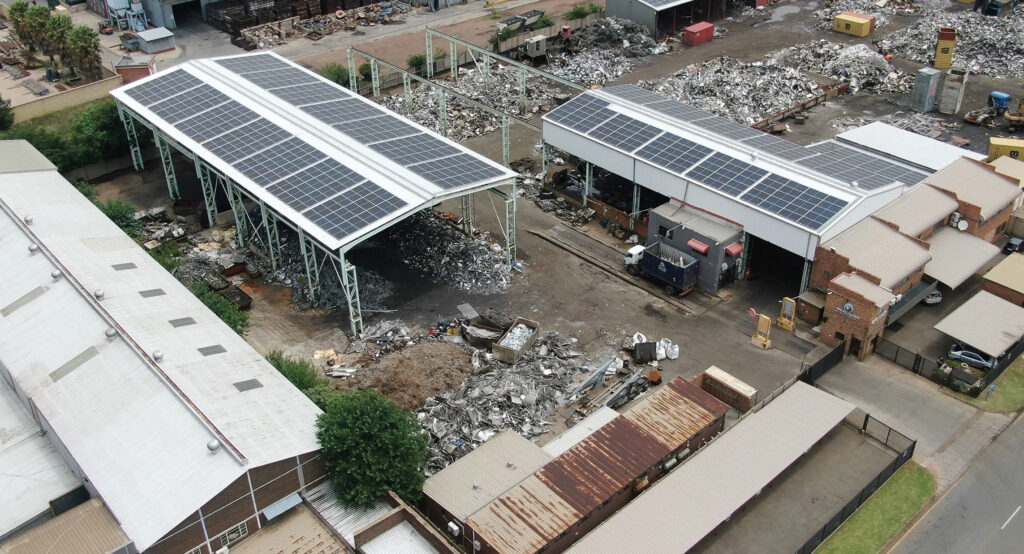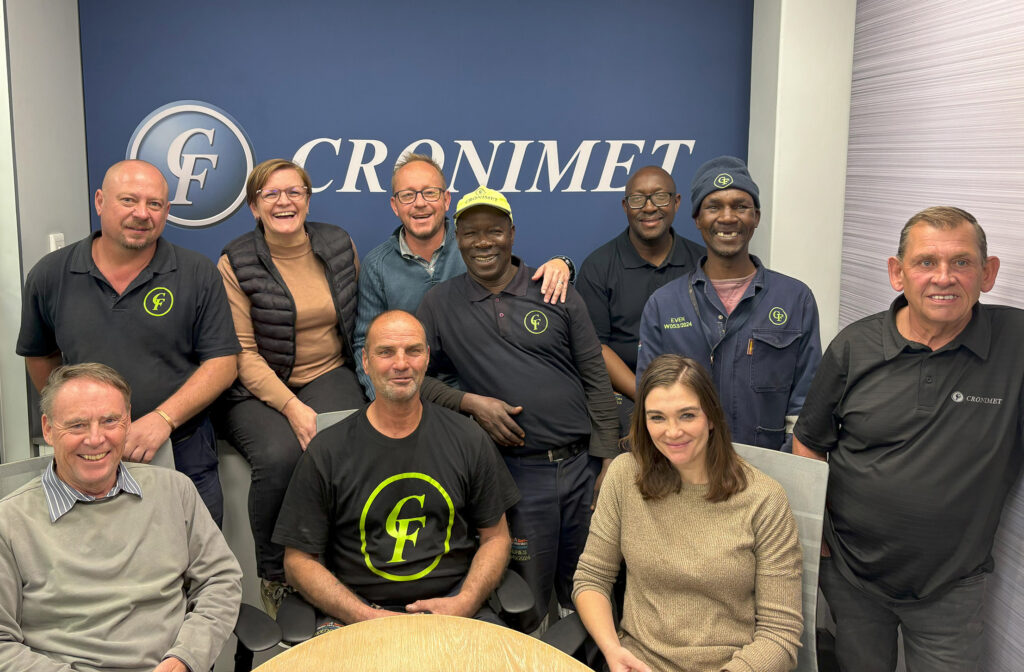- Perspective – May 2025
- Columbus Stainless Advert
- Market Intelligence – Sassda GPS
- Market Intelligence – Fair Trade or Foul Play? The Taxing Truth About Trade Tariffs
- State of the Stainless Nation
- Technical Insight – Stainless Steel and South Africa’s water crossroads
- NDE Advert
- Professional Profile : Pierre Rootman
- Technical Insight – Can mild steel survive where stainless fails?
- Millenium Metals Advert
- Member News – Cronimet
- Market Intelligence – Angola
- Fastenright Advert
- Member News – Coalition Engineering
- Member News – Scientific Engineering
- Sassda News – Western Cape Golf Day
SCRAP POWER PROGRESS: CRONIMET’S SUSTAINABLE STAINLESS STEEL JOURNEY

This year marks thirty years since Cronimet, the international stainless steel recycling specialist and long-time member of Sassda, established its operations in South Africa. For Cronimet South Africa Managing Director Bernard Maguire, it is both a milestone and a moment of reflection on how far the business and the industry have come. With clarity and candour, Maguire discusses Cronimet’s beginnings, the shifting challenges of local manufacturing, and the growing urgency of sustainability in a resource-conscious world.
Cronimet began in Germany in 1980, expanding across Europe before selecting South Africa as its first investment outside of Europe. The local arm officially launched in 1995, just as the country transitioned into democracy. “The emotional atmosphere was positive, and we were on a national honeymoon. But make no mistake, the decision was ultimately about business, it made financial sense,” says Maguire. His own career in stainless steel began ten years earlier. “That’s 40 years in this business. You don’t realise how much time has passed until you start putting the numbers together,” he reflects.
The local stainless steel industry Maguire entered in the 1980s was thriving, supported by a vibrant automotive sector, tank container manufacturing, architectural applications, and a strong domestic market for products such as Cutlery, holloware and tubing. It was a diverse and promising ecosystem, but the past decade has seen that picture change dramatically. “We’ve seen massive geopolitical and trade shifts. A decade ago, you wouldn’t hear ‘geopolitics’ in a business conversation. Now it’s front and centre,” says Maguire.
The rise of China as a global industrial power and the emergence of nickel pig iron from Indonesia disrupted traditional stainless steel markets. The economics of scrap shifted, and materials that once had stable value faced new competition. Meanwhile, global environmental awareness surged, transforming scrap metal from a low-cost substitute into a key player in sustainable manufacturing.
While global momentum around circular economies and climate goals accelerated, South Africa’s manufacturing landscape faltered. “In 1995, stainless steel manufacturing in South Africa was vibrant. We had automotive, tank containers, architecture, and strong domestic markets like cutlery and tubing. Today, much of that is gone. We’ve stalled. And in some cases, we’ve scored own goals,” says Maguire. He attributes the sector’s decline in part to government interference and restrictive trade regulations. “We know what needs fixing, but the industry isn’t being heard,” he adds.
Sustainable growth
In contrast, Cronimet has adapted by putting sustainability at the heart of its business. Where input cost once dominated decision-making, today environmental impact and efficiency are central to how the company operates.
This mindset has led to serious investment. Cronimet South Africa recently installed 594 photovoltaic panels that allow its operations to run on solar power during daylight hours. Diesel-powered forklifts and heavy loaders have been replaced with electric versions. “These weren’t decisions we were forced into due to load shedding. They were strategic moves to reduce our environmental impact and long-term operating costs,” says Maguire.
Technology has also changed the way scrap is processed. While some tools such as handheld analysers remain essential for identifying materials, new techniques allow Cronimet to blend and refine stainless steel scrap that contains high levels of copper, which previously had little to no market value. “What used to sell for cents now has real value because of better recoverability. We’ve shifted our mindset from disposal to beneficiation,” says Maguire.
Yet even as sustainability becomes more integrated into business models globally, Maguire believes the concept of the circular economy remains poorly understood in South Africa. “In Europe, circularity is the default. Here, most people in the sector still don’t really know what it means. Ask ten people for a definition and you’ll get ten answers or blank stares,” he says.
He believes industry bodies and the recycling sector at large must take the lead in changing this. “We should be driving that conversation and educating both industry and government,” he says. For Cronimet, promoting circularity is not just a trend, but part of a broader commitment to building a future-proof business model. “It’s not just a PR line. It’s in our training, in our daily operations, in how we plan ahead,” Maguire says.
Facing local challenges with global vision
Although Cronimet initially considered large-scale celebrations for its thirtieth anniversary, global and local uncertainty led to a more modest approach. Instead, the focus is on recognising the people who built the business, including several employees who have been with the company since its inception. That loyalty and continuity, Maguire believes, are part of what makes Cronimet resilient and forward-looking.
Looking to the future, he sees opportunity not just in growing the company’s recycling operations but also in expanding its role in value-added production. “We’re asking our younger team: where do you see us in five or ten years? Maybe we’re not just about recycling anymore. Maybe we’re adding new value in different ways,” he says.
Globally, Cronimet is already experimenting with new processes, including converting scrap into specialised alloys and recovering materials from legacy mining dumps. These efforts reflect a larger ambition. “We’re not just shifting metal. We’re finding value in places others overlook. And we’re always asking how we can do it cleaner, smarter, and more sustainably?” says Maguire. Thirty years in, it’s clear that Cronimet is not standing still. It is evolving with purpose.

What is the Circular Economy?
The circular economy is an economic model that prioritises reuse, recycling, and sustainability. Unlike the traditional linear system of take, make, and dispose, circularity aims to keep materials in use for as long as possible. In the stainless steel industry, this means using scrap instead of virgin materials, cutting emissions, and reducing energy consumption. Circular models help businesses become more resource-efficient while also reducing environmental impact.

